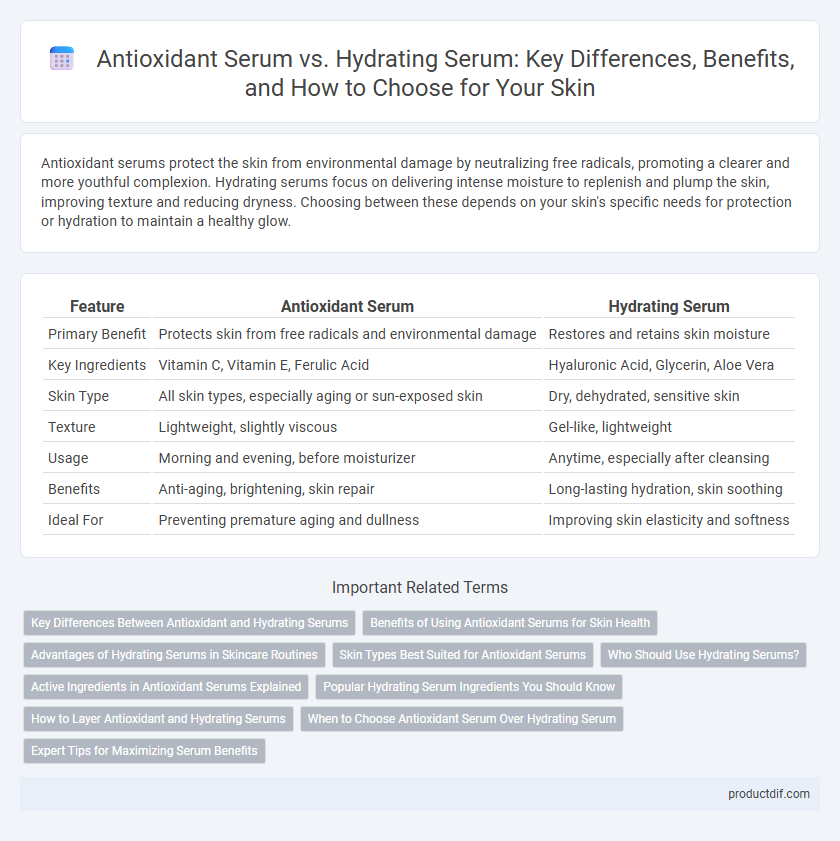Antioxidant serums protect the skin from environmental damage by neutralizing free radicals, promoting a clearer and more youthful complexion. Hydrating serums focus on delivering intense moisture to replenish and plump the skin, improving texture and reducing dryness. Choosing between these depends on your skin's specific needs for protection or hydration to maintain a healthy glow.
Table of Comparison
| Feature | Antioxidant Serum | Hydrating Serum |
|---|---|---|
| Primary Benefit | Protects skin from free radicals and environmental damage | Restores and retains skin moisture |
| Key Ingredients | Vitamin C, Vitamin E, Ferulic Acid | Hyaluronic Acid, Glycerin, Aloe Vera |
| Skin Type | All skin types, especially aging or sun-exposed skin | Dry, dehydrated, sensitive skin |
| Texture | Lightweight, slightly viscous | Gel-like, lightweight |
| Usage | Morning and evening, before moisturizer | Anytime, especially after cleansing |
| Benefits | Anti-aging, brightening, skin repair | Long-lasting hydration, skin soothing |
| Ideal For | Preventing premature aging and dullness | Improving skin elasticity and softness |
Key Differences Between Antioxidant and Hydrating Serums
Antioxidant serums are formulated with ingredients like Vitamin C and E that protect skin from environmental damage and free radicals, promoting a brighter, more even complexion. Hydrating serums contain humectants such as hyaluronic acid that attract and retain moisture, ensuring deep skin hydration and plumpness. While antioxidant serums focus on protection and repair, hydrating serums primarily deliver moisture to improve skin texture and elasticity.
Benefits of Using Antioxidant Serums for Skin Health
Antioxidant serums protect skin from free radical damage caused by UV rays and pollution, reducing signs of aging like fine lines and wrinkles. They enhance skin's natural defense mechanisms, promoting a brighter, more even complexion while minimizing inflammation and redness. Regular use improves overall skin health by boosting collagen production and preventing oxidative stress.
Advantages of Hydrating Serums in Skincare Routines
Hydrating serums deliver intense moisture through ingredients like hyaluronic acid and glycerin, enhancing skin plumpness and elasticity. Their lightweight formulas rapidly absorb, improving skin texture without clogging pores or causing breakouts. These serums support the skin's natural barrier, preventing dryness and promoting long-lasting hydration for a healthier complexion.
Skin Types Best Suited for Antioxidant Serums
Antioxidant serums are best suited for normal to oily and combination skin types as they help protect against environmental damage and reduce inflammation without clogging pores. These serums often contain ingredients such as Vitamin C, Vitamin E, and Ferulic Acid, which combat free radicals and promote skin repair. Individuals with sensitive or dry skin may prefer hydrating serums that provide moisture and soothe dryness more effectively.
Who Should Use Hydrating Serums?
Hydrating serums are ideal for individuals with dry, dehydrated, or sensitive skin seeking to boost moisture levels and improve skin barrier function. People living in dry climates or those exposed to air conditioning and heating benefit from the deep hydration and soothing properties of hyaluronic acid and glycerin-based serums. Those experiencing dullness or rough texture will find hydrating serums essential for restoring plumpness and enhancing skin radiance.
Active Ingredients in Antioxidant Serums Explained
Antioxidant serums primarily feature active ingredients such as vitamin C, vitamin E, ferulic acid, and green tea extract, which work synergistically to neutralize free radicals and protect skin from environmental damage. These antioxidants help reduce oxidative stress, improve skin texture, and brighten complexion by enhancing collagen production and minimizing inflammation. Unlike hydrating serums that focus on delivering moisture with ingredients like hyaluronic acid, antioxidant serums emphasize defense and repair through potent botanical extracts and stabilized vitamins.
Popular Hydrating Serum Ingredients You Should Know
Popular hydrating serum ingredients include hyaluronic acid, glycerin, and aloe vera, which attract and retain moisture to keep skin plump and smooth. Antioxidant serums often feature vitamins C and E, ferulic acid, and green tea extract to protect skin from free radicals and environmental stressors. Understanding these key components helps in choosing the right serum for hydration versus antioxidant benefits.
How to Layer Antioxidant and Hydrating Serums
Apply the antioxidant serum first to protect skin from environmental damage and neutralize free radicals, allowing its active ingredients like vitamin C or ferulic acid to penetrate effectively. Follow with a hydrating serum containing hyaluronic acid or glycerin to lock in moisture and enhance skin barrier function. Layering in this order maximizes antioxidant benefits while ensuring optimal hydration and skin resilience.
When to Choose Antioxidant Serum Over Hydrating Serum
Antioxidant serums are ideal for protecting skin against environmental damage caused by free radicals, especially in urban or high-pollution environments. Choose an antioxidant serum when aiming to reduce signs of aging, improve skin texture, and enhance overall skin resilience. Hydrating serums are better suited for boosting moisture levels and treating dryness, whereas antioxidant serums deliver targeted defense and repair benefits.
Expert Tips for Maximizing Serum Benefits
To maximize the benefits of antioxidant serums and hydrating serums, apply antioxidant serum first to protect skin from free radicals and enhance overall skin defense. Follow with hydrating serum rich in hyaluronic acid to lock in moisture and improve skin elasticity. Experts recommend layering serums on damp skin and using consistent application routines to boost absorption and efficacy.
Antioxidant Serum vs Hydrating Serum Infographic

 productdif.com
productdif.com